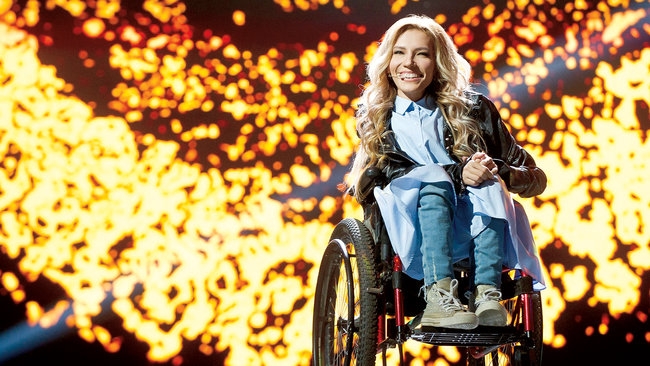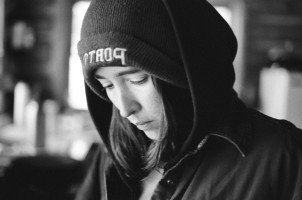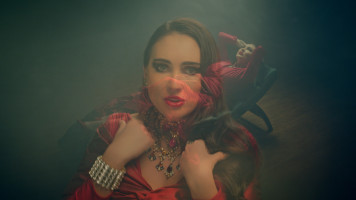Here at the International Exhibition Center in Kiev, Ukraine, on the night of the first Eurovision semifinal, nothing seems out of the ordinary — or at least, any stranger than usual. A Greek pop chanteuse stands center stage, singing a dramatic melody as a pair of bare-chested men dance and stomp in a large puddle. A Polish diva, all blond hair and overflowing cleavage, belts about animal rights before a screen showing a digital flock of birds. A buff Montenegrin whips his 3-foot hair extension to the beat of a disco number before tearing off a voluminous skirt to reveal spangled silver leggings. More than 10,000 Euro-pop devotees, speaking a dozen languages, cheer their favorites and wave their nations’ flags.
But it is no typical year at Eurovision, global music’s most popular kitsch fest. The performer who has dominated headlines across the continent for months is not even in the concert hall on this evening in early May. More than 400 miles away, in the Crimean city of Sevastopol, Russia’s Julia Samoylova — a 28-year-old with lustrous blond hair and a beatific smile — sits onstage in her wheelchair, flanked by members of Russia’s armed forces. In addition to performing her intended Eurovision entry, a saccharine ballad called “Flame Is Burning,” she sings of “air saturated with gunpowder” to commemorate Victory Day, a holiday marking the Soviet defeat of the Nazis.

Though she had earned Russia’s place at Eurovision two months earlier, Ukrainian authorities had subsequently banned Samoylova from the competition, citing a performance she had given two years ago in Crimea, the peninsula at the center of a territorial dispute between Ukraine and Russia. The week before the Victory Day concert, Samoylova tells me through a translator that her motives for appearing are purely patriotic. “I’ve been granted a chance to honor the memory of all those who lost their lives,” she says. “It has nothing to do with the Eurovision Song Contest — just coincidence.” But it’s hard not to see Samoylova’s appearance as less innocent — the latest not-so-subtle political provocation from her home country.
Eurovision is best known for its spirit of inclusion and entertainingly over-the-top performers. Created in 1956, it is the mother of all reality shows, a Miss Universe-meets-American Idol parade of artists who take pride in competing on behalf of their nations. (A jury and viewers from each country vote for songs from nations other than their own.) The televised final regularly draws close to 200 million global viewers (though it has been broadcast in the United States only since 2016, on Logo), and while its winners, who often already have record contracts, only take home a microphone-shaped trophy, they frequently find global success. Past victors include ABBA (1974, with “Waterloo”) and Céline Dion (1988).
I discovered Eurovision in 2007 as a recently transplanted American writer living in London. In reserved Britain, the show’s anything-goes approach felt refreshing and rebellious -- my first Eurovision, I cheered for a tinfoil-wearing Ukrainian drag queen. (Later I started Wiwibloggs, an independent news site devoted to the competition.)
But the contest has historically served as a lens for more serious subjects, too. With performers from more than 40 countries thrust into close proximity for two weeks, it is a kind of microcosm of Europe and the myriad issues that afflict it. In 2015, Armenia submitted “Don’t Deny,” a song marking the centenary of the Armenian genocide. (It was forced to change the title to “Face the Shadow.”) When Austria’s Conchita Wurst, a bearded drag queen, won in 2014 in the aftermath of Russia’s anti-LGBTQ legislation, Russian politicians called her victory a sign of “moral decay of the West.” In 2000, Israel’s broadcaster of Eurovision disavowed its country’s own act after the group waved Syrian flags.

With all the disruption now afoot on the global stage — from Russia’s possible U.S. election meddling to the groundswell of (ultimately unsuccessful) support for Marine Le Pen in France to, well, President Trump — perhaps it’s not surprising that this year’s Eurovision was destabilized, too.
Eurovision’s diversity arguably makes it far more engaging to watch than any American Idol finale — not to mention a beacon for the marginalized groups across the world that, to a large extent, make up its fan base. But as Samoylova learned, it also means that a young woman with spinal muscular atrophy, wishing to sing a song of hope, can find herself in the center of an international fracas — to her embattled home country, a sympathetic representative; to Ukraine, technically at least, a criminal. “Julia became a symbolic soldier in Russia’s conflict with Ukraine,” says Dean Vuletic, a historian and Eurovision scholar at the University of Vienna. “The 2017 contest became a stage on which a real war was waged by other means.”
In Eurovision tradition, each year’s winning country becomes the next year’s host, and so it went with Ukraine. In 2016, Jamala — a glamorous 33-year-old Muslim known for her sophisticated fashion and electro-pop sound — took home the crown at the competition in Stockholm. With lyrics like “When strangers are coming, they come to your house, they kill you all and say, ‘We’re not guilty, not guilty,’” her winning song, “1944,” told the story of Josef Stalin’s expulsion of Crimean Tatars that year, including Jamala’s own great-grandmother. As Jamala tells me outside her dressing room at this year’s contest, “It’s about our historical background. We made some mistakes, but we are a new generation, and we can’t do this in the future.”
Russian political leaders perceived “1944” as a comment on the country’s nationalist agitations under Putin, and onlookers guessed that Russia might sit out the 2017 contest in protest. But on March 12, Russian broadcaster First Channel revealed it had chosen Samoylova to represent the country. She had risen to fame on Faktor A — Russia’s version of The X Factor — and performed at the 2014 Paralympic Games in Sochi. Following the announcement, Samoylova assures me that “the only thing worrying me is my weak English. Also the thought that I absolutely need to perform well to be worthy of the choice Russia made.”

Ten days later, Ukrainian security officials banned Samoylova from entering the country. Since spring of 2014, after Russia annexed the Ukrainian territory of Crimea and ensuing skirmishes on the eastern border displaced at least 1.4 million Ukrainians, Ukraine and Russia have effectively been at war. By entering Crimea in 2015, Samoylova had breached Ukrainian law. Russia could still compete at Eurovision, authorities said, but only with an artist “who did not violate Ukrainian legislation.” The European Broadcasting Union, which oversees Eurovision, condemned Ukraine’s actions but offered a workaround: Samoylova could perform via satellite. Russia’s state broadcaster refused.
Knowingly or not, Russia had created the perfect PR storm: selecting a disabled singer who fit Ukraine’s chosen 2017 theme, “Celebrate Diversity,” but who had also broken its law. The host country — which, unlike Russia, had not been recently booed at Eurovision — was cast as the aggressor. A Samoylova performance could have given visibility to a group too often treated as invisible; instead, her absence only highlighted Moscow’s most likely less-than-altruistic motives. The EBU rebuked Ukraine. “We had a promise in writing and orally from the prime minister down that everyone was welcome at the song contest,” says Frank-Dieter Freiling, chairman of the EBU’s Eurovision Song Contest Reference Group, which governs the contest. “We were disappointed Ukraine didn’t live up to their word.”
In late April, competitors from 42 countries descend on Kiev for the first Eurovision rehearsals, amid extra-tight security prompted by ongoing terrorist activity in Europe. (Weeks earlier, an ISIS recruit had driven a hijacked truck into a crowd at a Stockholm department store, killing five.) “There is always a risk that someone with a different agenda is taking aim at the song contest,” Freiling tells me. Inside, we watch rehearsals as security guards prowl, carrying clubs.
In the end, neither security issues nor the Ukraine-Russia standoff dampen the spectacle. At the first semifinal on May 9, contestants ranging from Sweden’s Robin Bengtsson (who sings while dancing on a treadmill) to Azerbaijan’s Dihaj (joined onstage by a man wearing a horse head, voguing on a ladder) shimmy onto the mammoth stage, with its 11,000 square feet of LED screens. Twenty-six acts ultimately advance to the final, including one of the bookies’ favorites — bohemian Portuguese singer Salvador Sobral. Four days later, the grand finale unfurls in predictably dazzling form. During the voting interval, Jamala performs her new single, “I Believe in U” (“The ‘U’ is for Ukraine,” she tells me); during the opening bars, a Ukrainian streaker mounts the stage and flashes the audience.

Ultimately, it’s the quietest competitor who takes the prize: Portugal’s Sobral, singing a delicate, jazz-inflected tune called “Amar Pelos Dois” (Love for Two). Sobral, like Samoylova, came equipped with a sympathetic back story: His sister, Luísa, wrote “Amar Pelos Dois” for him, and he had had to skip rehearsals owing to a serious heart condition. In a year when cynicism nearly overwhelmed Eurovision, his minimalist performance — he sings softly, alone on a bare stage — feels like a throwback to the Eurovision of old, when music mattered more than machinations.
But political intrigue has a way of resurfacing after the contest. Two days after Sobral’s win, speaking at an economic summit in Beijing, Vladimir Putin defended his country’s decision to stay out of the competition. “I believe that our agencies involved in that process did the right thing,” he says. “From my point of view, the current authorities in Kiev are unable to host events of this kind.”
Eurovision has but one line of defense where its integrity is concerned: the EBU’s Reference Group, which on June 12 will meet to decide whether it will punish the Ukrainian and Russian broadcasters. “We want to make sure no one is using the song contest for their own political interests,” says Freiling, adding that this year turned into a “propaganda war on both sides.”
Though she didn’t perform, Samoylova may still be a winner: Thanks to the publicity, she has won scores of new fans and boosted the visibility of physically challenged performers — all while representing a country that Human Rights Watch has cited for mistreatment of disabled children. “The news that I could not come to the contest hurt me, but I never give up, never,” she tells me. “I would like to say to all the people — with physical challenges or without them — believe in yourselves, never give up and make your dream come true.”
The day after Eurovision, a popular talk show on Russia’s First Channel airs a special, Blacklist for Eurovision, devoted to Samoylova’s recent travails. The host and commentators describe their disgust over her treatment, but the artist herself, who wears a rhinestone between her eyebrows, remains serene. “The participants were wonderful — Eurovision is always a celebration,” she says. “To be honest, there were not so many memorable songs.” She smiles demurely as the host turns the conversation to 2018. “Now we know for sure,” he announces. “Julia will represent Russia in Portugal.”
Running Afoul Of Russia
Moscow and its policies negatively impacted the contest long before this year.
2007, Helsinki
Ukrainian drag queen Verka Serduchka repeatedly sang “lasha tumbai,” a nonsensical phrase she claimed was Mongolian for “whipped cream.” Russia took offense, claiming it was a mispronunciation of “Russia Goodbye” and an insult after Ukraine’s Orange Revolution. Russia banned Serduchka from entering the country for a year after the performance.

2009, Moscow
Stephane & 3G won Georgia’s Eurovision selection with “We Don’t Wanna Put In,” an apparent dig at Putin after, in 2008, Russia aided separatist forces in Georgia’s South Ossetia. Fearing tensions in Moscow, the European Broadcasting Union banned the song. Georgia withdrew from the contest.

2014, Copenhagen
Following Putin’s introduction of anti-LGBTQ legislation and annexation of Crimea, Russia’s Tolmachevy Sisters competed with the sappy love song “Shine.” The audience unfurled gay pride flags and booed during the duo’s performance and again during the voting results, when the 17-year-old twins broke down in tears. They came in seventh place anyway.

This article originally appeared in the June 17 issue of Billboard.








